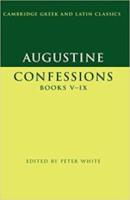
CUP (2019) p/b 358pp £22.49 (ISBN 9780521253511)
This new volume continues the work of Gillian Clark, whose excellent edition (in the ‘Imperial Library’ sub-branch of the ‘Cambridge Greek and Latin Classics’ series) of Confessions 1-4 came out in 1995. A comparison of the two books is good evidence of the increasing girth of classical commentaries: Clark’s edition weighs in at about half the size and weight of W.’s book, not least because W. devotes vastly more space to the explanation of linguistic usage and nuance than his predecessor.
The Confessions is full of variety and interest: its style veers between prayer addressed to God—peppered with abundant second-person questions to the Almighty (and/or to himself)—and a conventional narrative which describes people and events in his own life. As such it contains colour and information which the omniscient deity (presumably) does not need—but which we do.
Confessions 5-9 covers the period from 382/3 to 387AD, a period which saw Augustine transform from being a dissolute 28-year-old Manichean teacher of rhetoric in Carthage (with a mother, concubine and son for company), to his new life as an orphaned celibate Christian on the point of going back home to Thagaste at the age of 33. These five books contain some of the best material in the whole work: the Manichean bishop Faustus with his surfeit of spin over substance, as contrasted with the saintly bishop Ambrose; the wonderfully drawn picture (9.9) of his mother Monnica (sic: no Anglicising of her name here) followed by their rapturous joint vision of the kingdom of heaven and her subsequent death (9.10-11); his friend Alypius’ conversion away from his love of the games (6.7), and of course (8.7.17) his infamous prayer da mihi castitatem et continentiam, sed noli modo (‘give me chastity and self-restraint—but not just yet’). Book 8 ends (8.12.29) with the brilliantly told ‘bibliomancy’ episode: Augustine, in floods of contrite tears under a fig tree, hears a child singing tolle lege (‘pick up and read’) and understands this to be a divine command. He opens the bible at random and sees his past and his future mapped out in the words of St. Paul (Romans 13.13-14). W. comments wisely that Augustine ‘is completely true to character here in being ready to believe that a problem is to be solved by looking in a book’: he discusses the existence of alternative meanings for tolle lege (the ‘two most famous words of Confessions’), but does not describe them: some readers have decided that Augustine ‘embellished, fantasized or otherwise fictionalized this part of his experience in the garden’ but W. rightly steers us rather towards reading this passage as the wonderful piece of focalised psychology and superb narrative which it is.
Augustine’s passion for (and expertise in) rhetoric is manifest in his Latin, and W. is expert at helping us unpack the rhetorical influences on the text, as well as helping us to navigate the un-Ciceronian seas of his syntax-bending and novel vocabulary. He quotes classical Latin only where Augustine is obviously referring to it (e.g. 5.4.7, 7.1.1, 6.11.18) but he quotes generously from the biblical sources and from other works by Augustine (no mean feat in the case of an author who wrote over 5 million words), showing us where and why Augustine has blended his own words with those of scripture.
The text is largely O’Donnell’s of 1992. There is no apparatus criticus as such but W. amply discusses (e.g. 8.12.29 de uicina domo) textual issues in his notes. The commentary is outstanding throughout and ought to inspire a new generation of readers of this author: W. gives us all the help we need to understand the language, the background (historical, biblical and theological) and the style. He gives us superb elucidation of such issues as Manicheanism, assuming no prior knowledge on the part of the reader and yet taking us swiftly to the heart of the controversy. W. also has a knack of unpicking the writer at work: see for instance the deft summary of 6.11.18-19 followed by his clear explanatory notes on the passage—the biblical and classical sources and above all the literary power of this ‘remarkable soliloquy’ whose self-torturing questions recreate for the reader the anguish of his youthful soul as it questions the value of his life and the prospect of his death.
There is a select bibliography, an index of Latin words and an index of topics. The book is proofread and edited to the highest ‘Green and Yellow’ standards and the whole volume is relatively inexpensive for the riches which it contains. tolle lege.
John Godwin
